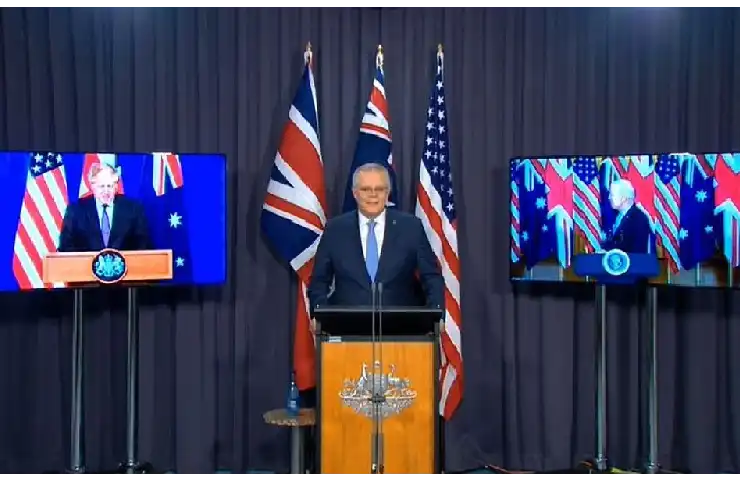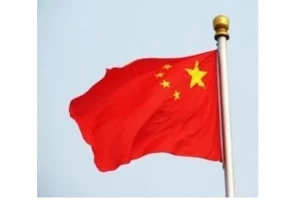The US took the world by storm this Wednesday after President Joe Biden announced the AUKUS trilateral grouping. Under the newly-formed alliance, the US will provide nuclear-powered submarines to Australia and will work collaboratively in the Indo-Pacific region. This makes Australia the seventh country in the world after the US, the UK, Russia, France, India and China to own a nuclear submarine.
What exactly is this development? India Narrative profiles the group and its implications for a world in turmoil due to a debilitating virus and a shifting power axis.
The AUKUS
The AUKUS is a three-nation alliance between Australia, the UK and the US announced by Biden from the White House. Announcing the pact from the White House, Biden said: "This is about investing in our greatest source of strength, our alliances, and updating them to better meet the threats of today and tomorrow. It's about connecting America's allies and partners in new ways".
The word 'China' has not been mentioned. But it is a clear hint that "the threats of today and tomorrow" which Biden mentions in his address are a reference to China which has in the last two years emerged as a bully to its neighbours and a rival to the US.
Under the pact, the US and the UK will provide Australia with nuclear-propelled submarines. How it is to be done is still not spelled out but in the immediate run the US could even deploy some of its submarines on the Australian coast as a deterrent to China. What is also not known is the role of the US and the UK in the submarine deal.
Benefits to Australia
With these nuclear-power submarines, Australia will be able to take on China in the increasingly fraught Indo-Pacific region. These submarines will be able to travel long distances, with speed and stealth. The Australian navy can now easily reach the contested South China Sea to promote the idea of a "free and open Indo-Pacific".
Why is France angry?
France was livid at the pact because Australia plans to end the lucrative $40 contract with France for buying 12 conventional submarines. The subs were being manufactured by the Naval Group of France, which is partly State-owned. For France cancellation of the deal means loss of income as well as jobs.
France is also angry with the US for "stabbing it in the back". Reacting with fury, French Foreign Minister Jean-Yves Le Drian said: "This brutal, unilateral and unpredictable decision reminds me a lot of what Mr Trump used to do".
However, France–a part of NATO and a US ally, is unlikely to rock the broader alliance or sentiment against China.
China's reaction
China has said that the deal will lead to an arms race and shows the cold war mentality of the US and its allies. Sharpening the rhetoric, Chinese newspaper Global Times said that Australian soldiers were likely to be the first to die in a Chinese counterattack.
US-China relations have been at a low after the Trump administration hauled up China over unfair trade practices as well as a poor human rights record. Biden's ascension to the White House has not led to any change in Washington's policy over China. The latest deal only confirms that Washington continues to muster allies against China–which under President Xi Jinping had grandly announced that Beijing will challenge Washington for global supremacy.
Impact on Quad
Prof. Baladas Ghoshal—former chairman of the Centre for South and Southeast Asian Studies, JNU, told India Narrative that the AUKUS is unlikely to impact the Quad in a negative way. He says: "The formation of the US, the UK and Australia trilateral does not rival the Quadrilateral grouping. It supplements the Quad. Australia is not diluting its commitment towards the Quad. The 2+2 dialogue with India shows that Australia is trying to build its engagement with New Delhi".
Reaction in Europe
The European nations and other US allies have been stumped by the trilateral pact. Most are unhappy to have been left out, besides not having been consulted at all. Europe has been miffed with the US after the spectacular failure of the NATO in "rebuilding" Afghanistan, particularly after the chaos that accompanied evictions.
Smaller groups to be in vogue
Ghoshal says that in a multi-polar world, countries are building smaller groups to fix particular areas. These groupings are emerging on the lines of issues and are not seen as an overarching relationship. Therefore, multiple arrangements are coming into play to balance different aspects that a country needs to address.
"New challenges are coming up, therefore, new arrangements are taking place. Countries are talking about climate change, health and vaccine cooperation also. Now, it is no longer only about security. Coalitions of issue-based understand will emerge. Because of this, countries will try achieve their different goals by joining or forming multiple groups or countries", Ghoshal added.
Australia's nuclear submarine deal with US miffs France, says it is "stab in the back"
Poking China in the eye, US considering adding "Taiwan" to rep office name
In blow to China, US and Philippines stick to military alliance




















